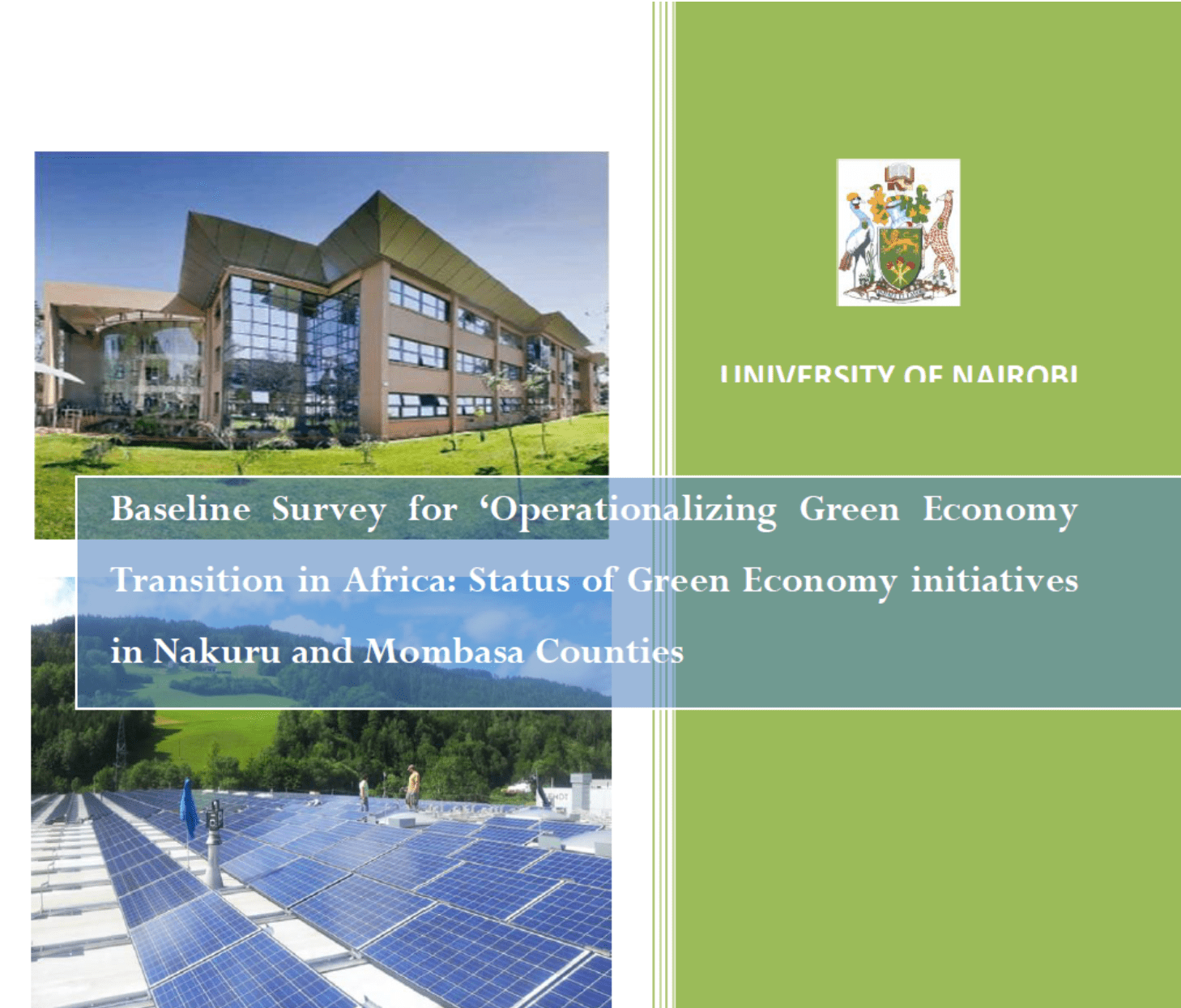Baseline Survey for Operationalizing Green Economy Transition in Africa

Baseline Survey for Operationalizing Green Economy Transition in Africa: Status of Green Economy initiatives in Nakuru and Mombasa Counties
The Institute for Climate Change Adaptation of the University of Nairobi, undertook a study on behalf of:
- International Climate Initiative (IKI)
- German Federal Ministry for the Environment, Nature Conservation, Building and Nuclear Safety (BMUB)
- United Nations Environment Program (UNEP)
- German International Organization (GIZ)
- Ministry of Environment, Natural Resources and Regional Development, Kenya
- County Governments of Nakuru and Mombasa.
The study sought to establish the status of Green Economy initiatives within specific sectors of the Nakuru and Mombasa Counties. The aim was to acquire and update information for each of the selected sectors and analyse and state the main findings of Green Economy.
Some of the issues which emerged from the survey are summarized below:
- Environmental issues and related indicators: The study established that waste management is a major environmental issue for both counties.
- Wellbeing and quality indicators: The study found no reliable figures on the percentage of people employed in the assessed sectors. For some, the work income is the sole livelihood, but for others it only supplements their earnings.
- Green economy policy interventions: It was established that many sectoral policies and laws with significant relevance to Green Economy are not harmonized with each other and with the Constitution. In addition, weak enforcement of laws and weak implementation of policies remain major issues of concern.
- County planning cycle: It was found that both Counties incorporate a number of key documents, tools, methods and public participatory platforms which guide development planning at the County level.
- Planning methods: the Counties employ methods such as: Information Communications Technology (ICT) forum with a toll-free number, policy briefs, SWOT, Cost Benefit Analysis.
Some of the primary threats to the effective implementation of the Green Economy Strategies identified are:
- High population and competition for diminishing resources
- Corruption and high costs of investment
- Climate change and high costs of rehabilitation of damaged ecosystems
- Lack of legal framework for enforcement
- Perennial water and power shortages
- Poor infrastructure due to budget constraints
- Weak land tenure system and widespread poverty
- Politicization and conflict of interest
- Limited funding and expensive alternative energy sources
- Lack of sufficient policy frameworks to support enforcement of greening initiatives
Recommendations:
- Political commitment: Enhance fiscal and monetary tools to steer economies away from business- as- usual- to the green growth path.
- Legal reforms: Legal reforms require revisiting existing laws and tuning their jurisdictions through amendments and directives.
- Financial Instruments: Government bodies re-evaluating subsidy provisions and redirecting funds towards ventures that provide permanent solutions to energy security issues.
- Technology Viability: Even with financial instruments in place, the choice of renewable technologies may prove to be a significant challenge. This calls for the use of public funds to support working groups to debate the type of renewable technology most suited to current geopolitical and climatic conditions.
- Human Capital Formation: Give due attention to the Green Economy human capital investments enhance the know-what, know-how and the know-why.
- Institutional Role: Initiate institutional adjustments or realignment at the county level to enable the adoption and adaptation to innovative solutions.
- Develop a common language: It entails the standardization of targets, benchmarks, indicators and measurement units and methods.
- Green Economy Communications strategy: Establish a well thought out sensitization and communications programme. This will help bridge the clearly immanent knowledge gap around issues pertaining to or even the necessity for a green economy campaign.
